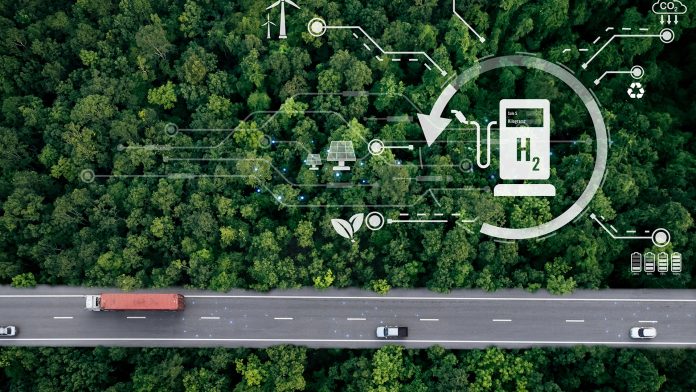Clare Jackson, CEO of Hydrogen UK, sets out the steps taken by Hydrogen UK and the UK hydrogen industry as a whole to advance hydrogen technology and industry to meet 2030 clean power targets.
As we stand at the threshold of 2025, the urgency to transition to clean power has never been more palpable. The UK government has set an ambitious target to achieve 2030 clean power targets, and hydrogen is poised to play a pivotal role in this transformation. Reflecting on 2024, it has been a year of anticipation and strategic planning.
In response, we at Hydrogen UK launched the Hydrogen UK Manifesto, providing a roadmap for hydrogen technology and infrastructure. Since its launch, significant strides have been made, but there is still much to be done.
A year in review: The foundations of a new government
Our members’ asks of the new government have been instrumental in shaping the hydrogen landscape. Our manifesto outlined policy recommendations for the new UK government to support the growth of the hydrogen sector from 2025 to 2030.
Key points from the manifesto include:
- Immediate action: Urging the government to progress first-of-a-kind hydrogen projects, fund projects within the Cluster Sequencing Process, and expedite allocation rounds for Hydrogen Storage and Transport Business Models.
- Deliver on targets: Supporting a technology-agnostic approach to meet the UK’s 2030 target of 10 GW of low-carbon hydrogen production, reviewing policies to reduce production costs, and committing to annual hydrogen allocation rounds.
- Infrastructure development: Calling for clear targets and timelines for hydrogen transport and storage infrastructure, the development of a core network of hydrogen pipelines, and comprehensive regulatory reform to accommodate hydrogen use in existing networks.
- Low Carbon Fuels Strategy: Recommending the publication of a Low Carbon Fuels Strategy, equal recognition and funding for hydrogen-fuelled vehicles, and a strategic plan for hydrogen refuelling stations.
- Technological flexibility: Advocating for maintaining technological flexibility in policy decisions for wider heat decarbonisation.
- Local content ambition: Setting a voluntary ambition of 50% UK local content across the hydrogen value chain from 2030.
- Investment in trade: Encouraging investment in hydrogen imports and exports to position the UK as a future hydrogen trade hub.
- Public sector finance: Suggesting targeted public sector finance into UK supply chain companies and a strategic approach between government and industry to attract overseas supply chain companies into the UK.
Bridging the gap
It’s been their first few months, so many elements of the manifesto have yet to be fully realised by the government. The industry is eagerly awaiting progress on several fronts. Ensuring that first-of-a-kind hydrogen projects can progress to final investment decisions by overcoming issues presented by the Low Carbon Hydrogen Agreement is crucial.
We are pleased that this month the funding of projects within Track-1 of the Cluster Sequencing Process was announced and we now await the announcement of successful Track-1x and Track-2 Projects. Expediting the first allocation rounds of the Hydrogen Storage Business Model and Hydrogen Transport Business Model is essential.
Adopting a single standard for low-carbon hydrogen across all government support mechanisms is another critical step. Reiterating the commitment to future hydrogen allocation rounds and releasing the consultation on the design of the hydrogen funding mechanism are necessary to maintain momentum.
Progressing gas distribution network hydrogen blending to mitigate demand risks for early hydrogen production projects is vital. Delivering substantial infrastructure development, regulatory clarity, and sustained financial support to scale up production and distribution are imperative for the industry’s growth.
Industry highlights: Pioneering progress
Despite this gap, our member organisations have made significant strides this year, showcasing the potential of hydrogen in various sectors, and thus the first to be recognised in our Hydrogen UK Awards.
HVS has made operational hydrogen-powered heavy goods vehicles (HGVs) a reality, demonstrating the viability of hydrogen in the transportation sector. Fuel Cell Systems Ltd (FCSL) has been recognised for its innovative hydrogen fuelling solutions, notably at the 2023 Goodwood Festival of Speed, using its mobile refuelling truck with green hydrogen.
Exolum has demonstrated excellence in the transport and storage of hydrogen using Liquid Organic Hydrogen Carriers (LOHC) in repurposed oil pipelines and storage tanks. Carlton Power has been acknowledged for advancing green hydrogen production projects to aid industrial companies in transitioning from natural gas. Lastly, HiiROC Ltd and Centrica plc have been recognised for utilising Thermal Plasma Electrolysis technology to produce low-carbon hydrogen, aiming to decarbonise gas peaking plants in the UK.
Hydrogen UK highlights
This year, Hydrogen UK hosted a Hydrogen Investment Forum in collaboration with DESNZ, which saw over 300 C-suite attendees and 80 government officials come together to propel the hydrogen industry forward.
Additionally, our Hydrogen UK Parliamentary Reception was a notable event where we had the privilege of hearing from Sarah Jones, Minister for Industry (responsible for hydrogen). This was her first public address to the hydrogen industry following the recent election. Minister Jones reaffirmed the government’s commitment to hydrogen, highlighting its diverse end uses and its potential to transition jobs and deliver economic benefits across the UK.
She emphasised the importance of fostering a strong partnership between industry and government and acknowledged the critical need to advance HAR1 projects, which remains one of our association’s top policy priorities.
In her address, Minister Jones announced that she is developing a decarbonising industry strategy as part of a broader industrial strategy, and she welcomes active engagement from the industry on this initiative.
Hydrogen UK will continue to collaborate with our members, DESNZ, the Hydrogen Innovation Initiative, the Hydrogen Delivery Council, and other stakeholders to advance our members’ priorities.
Looking ahead to 2025
As we look ahead to 2025, our hopes are high. We aim to build on the progress made in 2024 and address the challenges that remain. Our focus will be on helping the country decarbonise sectors that are difficult to abate, leveraging hydrogen technology to grow the economy and create jobs, and becoming a north star for job transition from oil and gas to hydrogen. We also aim to be a critical enabler to meet clean power targets by 2030.
As the CEO of Hydrogen UK, I am deeply committed to driving this transformation. The countdown to clean power by 2030 has begun, and every step we take brings us closer to a future powered by clean energy. Let us embrace this journey with optimism, resilience, and a shared commitment to a scalable hydrogen economy.
Here’s to a new year, and I’m looking forward to supporting the industry with its ambitions, moving forward with increased speed.
Please note, this article will also appear in the 20th edition of our quarterly publication.










